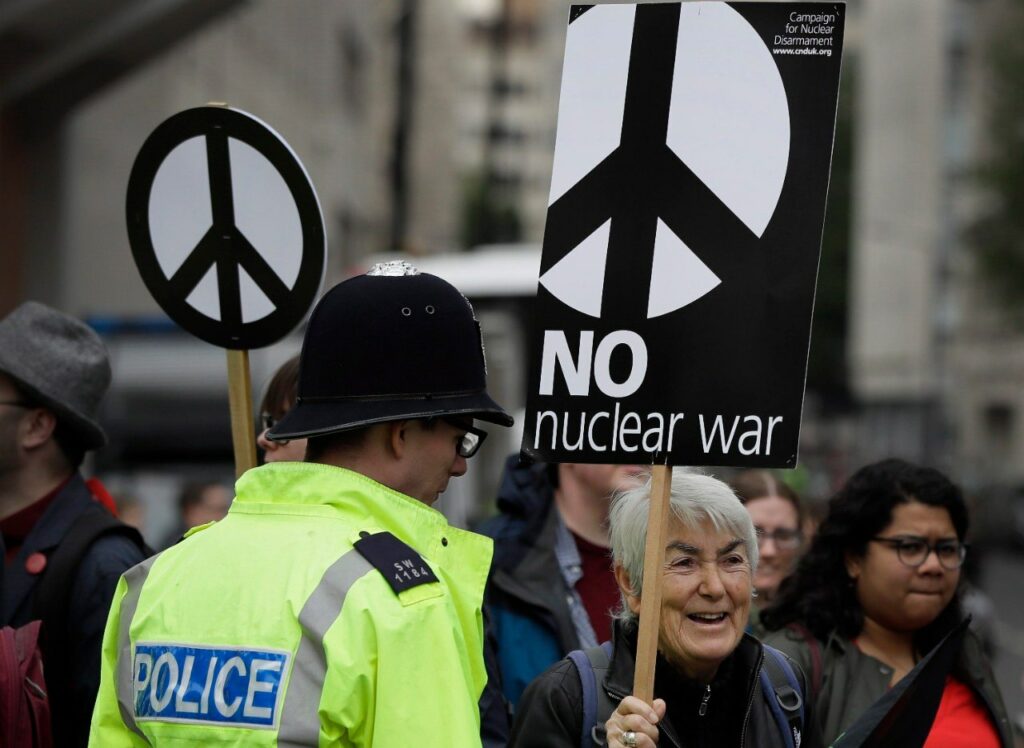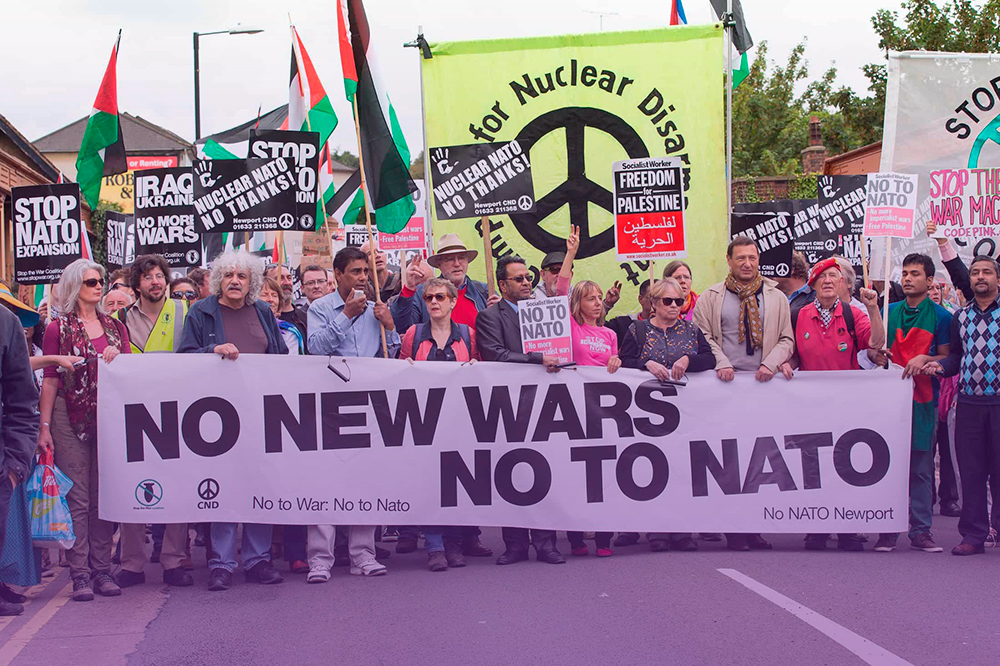The whole world has been closely following the news about the war in Ukraine, especially since February 24, when Russia started simultaneous bombings in different parts of the country. In the same period, other countries continue to be targets of violence and occupation: Palestine, Syria, Yemen and Somalia. Considering the imperialist agenda that informs hegemonic media, it is essential to produce and circulate information about how complex each situation is, based on the analyses and claims by organizations and movements that are permanently fighting for peace.
Kate Hudson is the General Secretary of the Campaign for Nuclear Disarmament (CND), a UK-based organization with decades of local and international presence. Kate first became involved with the organization in the 1980s, “back then when the US and NATO wanted to station a new generation of nuclear missiles in Western Europe”.In the 1990s, the United States implemented its so-called missile defense system. “Many of us could see what was happening with NATO expansion. In 1999 there was a first big wave of NATO expansion. There was the NATO war in Yugoslavia, so we could see that instead of this lovey new world of peace that we were supposed to have at the end of the Cold War, we were getting this new increasingly militarized new tense world”.
In her March 7 interview with Capire, Kate provided a comprehensive analysis of the facts and risks regarding the wars going on right now and NATO, the geopolitics and technologies of warfare. She also stated that dialogue and diplomatic solutions are essential for peace. This interview integrates the content that Capire will produce until June 2022, in preparation for the Peace Summit.
The Campaign for Nuclear Disarmament is an organization that has been around for many decades, and the goal of its creation is still relevant today. Could you share how the CND has been built over the years, considering both your work in the UK and internationally?
The CND was founded in 1958, particularly against British nuclear weapons, but also there was a big concern at the time of nuclear weapons testing in the air. Around that time, late 1950s early 1960s, there were literally hundreds of massive nuclear weapons and explosives being tested in the atmosphere by a number of different countries. Essentially by the US, UK and the Soviet Union which were developing this technology. The health consequences were very severe. You can imagine the impacts of Hiroshima and Nagasaki. Some of these tests were a thousand times the size of the Hiroshima bomb. The health impact of that was not only in the land and water. There were actually evidences of cancer clusters and peaks of cancer zones as a result of the radiation.
The precursors or forerunners of CND were actually women’s groups set up spontaneously against nuclear weapons testing. They were very concerned about the impact of the radiation on their children. There was a lot of information at that time around strontium-90 going into milk which was then fed to babies and children.
In the late 1950s there were all kinds of political and social changes. It was just two years after Britain has had its final big colonial defeat around the Suez crisis. There was a big shift going on in society, with the development of social movements for the first time. CND came out of that radical framing too. Since that time it has always been a mass movement, it has never been like a think tank or a NGO. We are a mass democratic movement.
Every year the leadership is elected by the members. Our policy is decided by the members, we rely entirely on our membership for the funding and the resources to do our work. We’re completely independent, therefore we can take whatever political campaigning positions our members want to take, with no constraint. There is freedom of movement. We are also diverse and inclusive as well. We don’t have any political requirements for people to sign up to. They just have to be against nuclear weapons. I think that’s why we stayed on track with it. Over the decades we have had strong brand recognition in Britain. Our sign became the peace symbol, that originated from CND.
We have a place in the heart of politics, sorta speak. But it’s a radical place. It’s a place where we strive to change government policy. Internationally, we have a very strong priority on alliance building. We work with many peace groups in other countries, across Europe, but also internationally. The anti-nuclear movement is a strong movement worldwide. We regularly go to Japan, the USA, and Latin America to further our work together across borders.
We live today in a world full of wars. What is NATO’s role in this?
It has a big role in it. Since the end of the Cold War we’ve seen how the Warsaw Pact, which was the NATO equivalent from the Soviets side during the Cold War, was dissolved. NATO didn’t choose to dissolve that same time to develop a different type of world and common security. NATO was maintained, and in fact it expanded in a number of waves from the late 1990s up to the present day. The peace movements universally were opposed to that expansion because it was a military expansionism. It meant bringing more and more countries into this military alliance. During the Cold War it was a defensive alliance and it actually never went to war.
When the whole reason for its existence was vanished, it then changed its remit to not being just a defensive alliance anymore. Instead it would engage in out-of-area activities. That was in 1999, and of course two years later it went to war in Afghanistan. NATO is the North Atlantic Treaty Organization, so why were they engaging in a war in Afghanistan? Essentially because when NATO started to expand it became a global military organization advancing primarily the interests of the US and its allies. It has become a global military presence, which is a CND concern because it’s a nuclear-armed military alliance.
It not only has nuclear weapons, it has a first use nuclear weapons policy. A small number of countries that have nuclear weapons say that they would never use them first, they would only use them in retaliation. That would be bad too. But to actually have a policy that you would use nuclear weapons first is incredibly provocative and destructive. It also has a policy that each member country has to contribute at least 2% of the country’s gross domestic product on spending on weapons which increases the militarization of the member states. It actually undermines their sovereignty. Because if the country decides that it wants to spend more on the health services, or on creating sustainable energy forms and dealing with the climate crisis, they can’t. They have to spend it on weapons.
Besides, we’ve seen at the NATO Heads of State Summit last year a new orientation and hostility towards the economic rise of China. That’s the next phase where NATO is going. They’ve got partners in Latin America, they do stuff in Africa and now they’re orientating to the Pacific to try and contain China, which they see as a kind of a hostile power. NATO is going global and that’s not a good thing.
The UK is an ally of the US, the imperialist power that directly and indirectly provokes more wars around the world. Last year, together with Australia, they signed a pact that has technology transfer and nuclear submarines at its core, the AUKUS. In their official discourse, they differentiate between nuclear power and nuclear weapons. How are nuclear power and nuclear weapons really related? And what are the dangers of this pact for the Pacific region and the world?
This is a very dangerous development. In Britain it seems to be part of our government policy of what they call Global Britain. We left Europe with Brexit, so we’re supposed to be having an orientation towards the rest of the world. That’s our government narrative. Unfortunately, the orientation seems to be military, portraying the idea of Britain as a military war fighting nation. That is not what we think Britain should be about.
AUKUS particularly is an agreement which means that the US and the UK will provide Australia with nuclear powered submarines. This would make Australia the only country in the world that is not a nuclear weapons State, but would have nuclear powered submarines. Why would they want this? They already have conventionally powered submarines. But the big deal about nuclear powered is that they can go out on exploration or undersea mission in the submarine for a much longer time and remain relatively undetected. Basically, they can go further for longer. If Australia wanted to be defending and patrolling their own seas nearby, they would have the conventional ones. If they wanted to go out on mission to other places and do other stuff, they would have nuclear powered submarines. And of course the US wants them to play a more active role in any future conflicts with China. It gives Australia a much greater military role in the region.
In terms of the relation between nuclear power and nuclear weapons, first of all they are based on the same technology. They both have to do with enriching uranium. Uranium is the material to produce that type of power or explosion in the case of weapons. The difference is how much you enrich it. If you want nuclear power, it’s enriched up to 20%. If it’s nuclear weapons, it’s enriched over 90%. When our prime-minister Boris Johnson was announcing AUKUS to the parliament, he said that it doesn’t contravene the Nuclear Non-Proliferation Treaty [The Treaty on the Non-proliferation of Nuclear Weapons – NPT]. It doesn’t break any international law because it’s not about nuclear weapons, it’s about nuclear power, and it’s perfectly legal to share nuclear power technology. He’s wrong.
Under the NPT, the exchange of civil nuclear technology is allowed, but it must be for peaceful purposes. If you’re sending war fighting submarines to a potential conflict in the Pacific region, how is that a peaceful purpose? As far as we’re concerned, that is illegal under international laws. AUKUS is increasing the militarization of the region by sharing military technologies and facilities. But there are a lot of opposition to that within Australia. We’ve been in contact with trade-unions, senior political figures, and also New Zeland, a nuclear-free nation. They’re all annoyed by the AUKUS agreement.

In all these years the forms and modes of warfare have broadened with the use of new technologies, such as drones, for example. What challenges does this pose for movements fighting for disarmament and against wars?
It’s a big challenge, but in another way it’s very simple, because they’re all killing machines. No matter what they’re made of or how they’re used, they’re all for illegal killings. But then again, what killing is legal? We have to find the ways of making the arguments against them and helping people to understand. Also, we must take into account all forms of hybrid warfare as well, whether it’s fake news or information warfare, artificial intelligence and surveillance. We have to understand the potential for war and conflict these have. Many new technologies have dual use. They can be used for civilians and for the military.
One clear example is space. Satellites can be use in communication and phones, so that we can be closer together. On the other hand, they can also be use for war fight, for information fighting on the earth, but also for fighting in space. We’ve seen the development of US Space Command, and other countries too. It is not only militarization on the ground, under water, in the air, now also the space.
We protest against drones. One of the worst things about it is the remote nature of the killings. If you’re just sitting on an office floor, in some city, watching something on your screen, you press a button and somebody thousands of miles away dies. That kind of distancing between the killer and the target has to be a bad thing in every ways. It became a form of extrajudicial killing – you don’t have to take terrorists to trial, for example. Anything that makes it just quick, easy and remote to kill somebody without question, when you don’t have to think about the moral or human implications, it is a disaster.
The World March of Women, among it’s struggles, fights against transnational corporations. One kind of corporation we fight against are technology companies, because of its controls and impacts on different areas of politics, economy and life. Artificial intelligence and surveillance have tools that are created and made available by some of these corporations. Such corporate power change anything in the dynamic or economics of war?
That brings me back to the origins of CND in the 1950s. President Eisenhower talked about the military industrial complex. It is now being expanded into these different aspects of life and social control. Powerful institutions are able to work together. In the old days, when the government wanted new weaponry and some companies could do it and offer more, they would make agreements and have election support. You’d have this unhealthy relationship between people that make the weapons and the government. The way this is developing, it is what in the old days would be called some sort of mind control.
Through the use of social media platforms, companies can follow what you click on, suggest what you would like to buy, what kinds of sites you should be directed towards, who you’re supposed to vote for in an election. It’s a way of shaping your thinking about what’s going on in the world. That all was developed from a straightforward commercial relationship into one that encompassed the way you think and how your ideas are shaped. We’ve really seen a big escalation in that over the last decade. That is incredibly dangerous.
The war in Ukraine is an example. The way the media has a role in this process as well. In Britain there has been pro-war, the glorification of military sacrifice, heroism understood in terms of willingness to kill and being killed. People have the right to defend themselves, but to create a climate in the popular consciousness where war is a good and honorable thing is something else.
Every death is a tragedy, and we absolutely opposed the invasion of Ukraine. We want that war to be ended by negotiation.
We don’t want more and more weapons and troops in there. We want a peaceful negotiation, a settlement agreement on common security for the region, so everyone can live in peace.Otherwise this can escalate to nuclear war. There has to be an understanding how all these different elements come together in that complex thing. In such a war, it is the common people that suffer, women and children, the poor. As a peace movement we are doing everything we can to counter war propaganda.
How do you see the conflict in Ukraine and what are the possible solutions? What are the strategies of the anti-war movement and how can we strengthen alliances with feminist movements on this agenda?
This is the most urgent question facing us. It’s terrible to see the results of that invasion and the impact of the conflict. So many people were forced to flee their homes in a massive refugee exodus. I should say here that I’m absolutely ashamed of the British government who is failing to open our doors to Ukrainian refugees at the moment. On Sunday [March 6th], the government allowed 50 Ukrainians to come here when other countries are welcoming tens of thousands of people coming from there and the population is mobilizing to provide homes and medical care. The UK government is shameful, particularly when it has done so much to escalate the tensions and to almost promote the war.
What’s been remarkable is the spread of anti-war sentiment. We’re all being inspired by the peace protests in Russia, and thousands of people continue to protest across the world. It is a call for negotiation. War is not going to be the answer to war. Peace is the solution.
We have to oppose very strenuously the calls for a no fly zone in Ukraine. A no fly zone would be imposed by NATO. It means that, if a Russian plane goes into their airspace, it will be shot down by NATO, and NATO would be at war with Russia. And that means that 20.000 nuclear weapons, some of them three thousand times the size of the Hiroshima bomb, will come into the conflict. That mean two nuclear power in war.
In Britain, when we have election, national leaders always say they are ready to press the nuclear button. It’s an existential disaster waiting to happen, so we have to pull back from the worst case scenario, the escalation. Whether it’s due to the no fly zone or due to some other episode. There has to be negotiation. Whatever people think about what’s happened so far, wherever they think about the leaders involved has to be about the future of humanity, the future of the people in Ukraine. There’s no coming back from a nuclear war.




